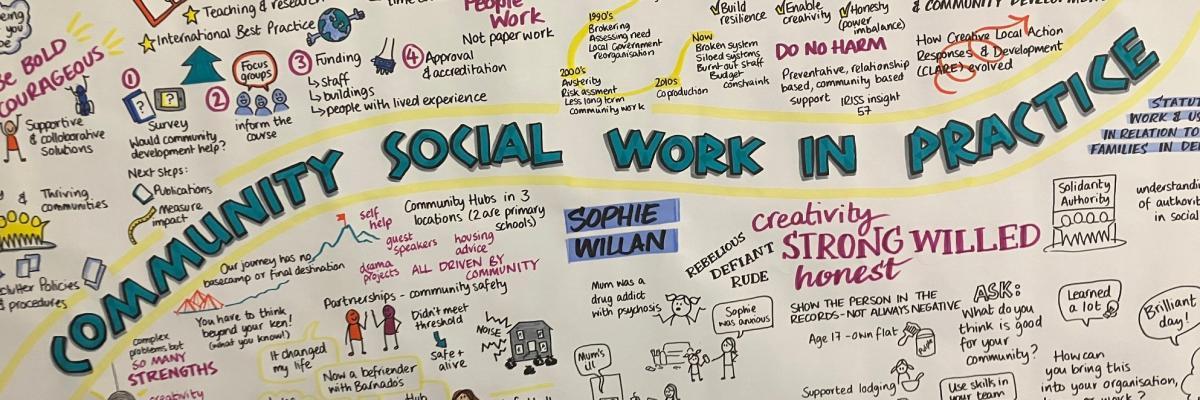Colin Turbett, social work author and consultant, shares his reflections on the community social work conference that was held in Dunfermline on 8 November 2022.
Background
Community social work (CSW) has had almost no profile over the last twenty years, neglected through years of managerialism and increasingly fragmented social work delivery models in Scotland and the UK. Focus has been on very downstream crisis-focused models – a trend captured in the Changing Lives report’s tiered approach to social work in Scotland from 2006.
This placed social workers at the pinnacle of a triangle where their prime purpose was to help people in dire need and at great risk of harm to themselves or others. The generic responsibilities to support people and ‘promote social welfare’ (in the words of the 1968 Social Work Scotland Act) were forgotten in the push to concentrate frontline social work teams on statutory work, with individuals who met eligibility criteria for stretched services. The attempts by some of us to promote discussion on how we could take social work back to the kind of upstream preventative and relationship work that the team in Kirkcaldy were piloting, met with interest but little buy-in.
Going upstream
So, on 8 November 2022, about 150 of us gathered together in Dunfermline to discuss how we could take social work upstream. The planning group had already done a lot of groundwork – talking to as many influencers as we could (including a Scottish Government minister). An attractive booklet, Social work off the books, was produced that outlined the story of the Fife CSW team, which was distributed at the conference. Our delegates included frontline staff and managers, trade union activists, a few people from universities, and some representatives of important social work organisations: SASW, Social Work Scotland, the SSSC, Care Inspectorate, Iriss and others.
Linking the conference events was Fife’s Chief Social Work Officer, Kathy Henwood, whose vision as a leader had instigated the council’s initiative. With a welcome from Fife Council, Steve Grimmond Chief Executive, offered his support for the development of community social work in Fife. It was notable that the event was also attended by several Fife councillors, including the leader of the ruling Labour Group – very welcome and necessary political support.
The keynote presentations started with a relevant and focused address by Fiona Duncan of The Promise Scotland. In her very welcome vision of a social work that recognised the importance of preventative support to children and families, she expressed enthusiasm for the spread of community social work.
She was followed by Fergal O’Brien from Northern Ireland, a charismatic pioneer of community development postgraduate courses for social workers there. He demonstrated impressive outcomes for the four years these have been running – over 100 graduates many of whom are practising creatively in communities across Northern Ireland. We look forward to the regional conference Fergal is organising in April 2023. Listen to Fergal speak about mainstreaming community social work and community social work education.
Next up was me – from the perspective of CommonWeal’s Care Reform Working Group, I traced the origins of community social work in Scotland – how it had all gone wrong and why we needed to move to community social work if we were serious about helping communities deal with adversity, poverty and the inequalities that come with ageing and ill-health. This was a role requiring the professional skills of social workers as part of core social services. A key message was that in a climate of economic chaos and 'austerity' it was not a question of not being able to afford such investment, but of not being able to afford not to, because of the increasing and overwhelming costs of what we currently do. I’ve been punting this stuff for some time now, but it felt great to have an audience who seemed keen to hear the basics of a revitalised community social work theory.
The final session of the morning was a conference highlight: a presentation in three parts by members of the Fife CSW Team: service manager Karen Pedder followed by team managers Vicki Cassells and Anne Fitzpatrick. Anne, brought up by a single parent father, told us how he had always told his children to solve their problems by advising them to 'go beyond yer ken' – a Fife way of suggesting that problem solving should be based on their own efforts at exploring issues, rather than what others told them from their experiences – a notion fundamental to CSW.
You can listen to Anne, Leanne and Janet speak about the community social work approach in Fife. I, along with Kathy Henwood introduce it, focusing on the characteristics of community social work and the set up in Fife.
A comic edge and workshops
By the afternoon, any weariness was soon shaken off by a poignant and extremely funny presentation by Bolton born comedian Sophie Willan. Using her own experiences as a child who grew up in a chaotic family with periods spent in foster care, she had much to say about our practices as social workers. In particular, she gave us examples of negative recording of her childhood from her files.
From an early age she was repeatedly described as ‘rude, rebellious, and defiant’ – attributes that were actually positives that had equipped her with resilience, humour and an ability to survive adversity. She was keen to show her support for community social work and her admiration for the tough job that social workers do.
A number of workshops were held on the topic of community social work:
Roisin Ferry, Caroline Stack, Charmaine McNally and Grainne McAnee from Derry, discussed the remarkable work of the Clarendon based social workers whose community consists of the 12,000 patients of the GP Practice: they have promoted individual and community wellbeing around a community garden, walking groups and other initiatives.
Shane Coulter and Mandy Cowden shared the experience of the long running CLARE project in North Belfast – a community development based social work third sector organisation providing for older people despite insecure funding and the challenges of Covid-19.
Becky Squires, Principal social worker for Adults from Cumbria, described the practice of social pedagogy in social work, a model that fits with the supportive, preventative and empowering basis of CSW.
Fergal O’Brien continued the theme of his keynote presentation with discussions around community social work and community development for undergraduates in training and post graduate social workers.
Professor Mark Smith from Dundee University outlined the view of the CommonWeal Care Reform Working Group on the proposals for a Scottish National Care Service – criticisms of the government plans, and constructive ideas for the kind of service that would match the NHS and root itself in communities.
Mie Engen from Aalborg University, Denmark, presented on the basis of her research into how statutory social workers in Denmark can accommodate their use of authority in child welfare, with social solidarity and the values inherent in social work. This is of interest for possibilities for using CSW approaches in statutory social work in Scotland.
How lives have been changed
The final part was a facilitated panel discussion of community members and partners from Kirkcaldy: Janet, Ross, Nicole and Mary, gave brave and powerful accounts of how their lives had been changed through their involvement in the hubs served by the team.
Striking also was Brian, a community safety officer, who described how the team had turned round the life of a troubled resident he had come across in his work who ‘did not fit the criteria’ for statutory social work support.
Pauline Buchan, experienced manager of Kirkcaldy’s Cottage Centre, a pre-school resource, gave brilliant testament to the importance of upstream services, and Jillian Mellis of Pathhead Primary School, talked of how it her school community had changed for the better.
Key learning for community social work practice
- CSW as demonstrated by the Fife initiative is a particular approach that seeks to link people with the levels of support they need where they live and gather. It is targeted at a community and not individuals, and support is individually negotiated and entirely voluntary.
- CSW is shaped by the community within which it operates. It is created through the co-production of workers, community members, and partners from statutory and voluntary agencies.
- Using the analogy of the fast-flowing river, CSW seeks to stop people falling in and being carried downstream to the point of drowning where they might be rescued by crisis focused rescue services.
- CSW requires the skills of trained professional social workers: the Fife team experience shows that workers need to “unlearn” some of what they know from mainstream statutory roles and release their creative and artistic potential in their practice.
- In the long-term, the CSW approach will impact on the burden of necessary statutory intervention for individuals and families in crisis – right across the range of social work from the cradle to the grave. There are tensions around the interface between the usual practices of social work and CSW – these need to be explored honestly and openly.
- CSW is different from community orientation, which can usefully be brought into every area of mainstream social work practice. This involves networking, an awareness of the community with all its strengths and weaknesses, and an ability to relate individual problems to wider issues in the locality or identified community involved.
- The conference heard from Northern Ireland colleagues involved in education, as well as community development social work (as it is known there). Their experience demonstrates the urgent need for a focus on community in both under and post-graduate training in Scotland.
Final thoughts
In all, it was an inspiring and ground-breaking conference, and one in which I feel very proud and somewhat humbled to have taken part – representing all the hopes and aspirations that brought me into social work in the 1970s. But this is not about the past but very much about social work’s future.
Well done the Fife team!


